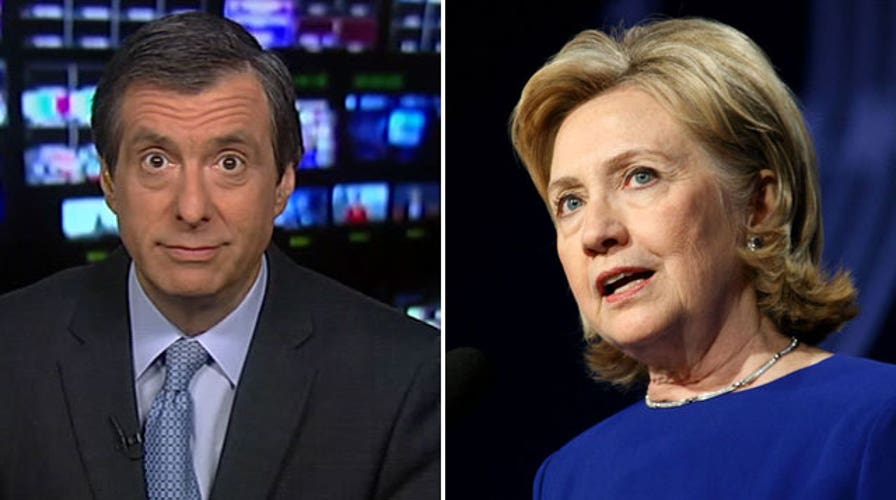Kurtz: Hillary finally spars with the press
'Media Buzz' host reacts to former secretary of state's comments about email controversy
Hillary Clinton finally answered questions about her private email Tuesday, leaving many of us wondering: What took so long?
After eight days of silence, the former secretary of state didn’t offer some sophisticated new argument for why she didn’t have a government account. She said it was for “convenience” and that she followed the rules — which she could have said the day after the New York Times story broke. There is simply no question that long silence hurt her and allowed the mounting questions to mushroom into a crisis.
Still, she stood there at the U.N. and took about a dozen questions, and that by itself helps her. It’s a heckuva better image than being barricaded in the bunker.
The questions, from veterans like Jonathan Karl and Andrea Mitchell, were good. But the first query, from a Turkish television reporter who wondered whether Hillary would be getting this kind of heat if she were a man, made me roll my eyes; I’m sure calling on him was no accident.
Hillary seemed in my view to be overly scripted and at times lawyerly, looking at her notes, repeating phrases and saying things like “I directed my counsel…” It wasn’t exactly Al Gore’s “no controlling legal authority,” but she never really broke through the narrow prism of her narrow defense. She didn’t disarm anyone by flashing much charm.
Her comments protecting her personal correspondence about Chelsea’s wedding and her mother’s funeral and even her yoga routine would have struck more of a sympathetic chord if she hadn’t been reading them from a statement.
Clinton weighed her words carefully, parrying a question about whether her conduct had been a mistake by saying it would have been “smarter” to have had two email accounts. She did not want “mistake” or “regrets” popping up in the headlines. But the whole convenience thing — it’s such a pain carrying two phones — seemed weak. She had aides to carry her stuff, and besides, lots of people have two accounts on a single BlackBerry or iPhone.
Hillary doggedly deflected several key questions without a response, including:
Should an independent arbiter examine her personal e-mail server, which contained all those personal notes she says she’s deleted?
How does she justify the Clinton Foundation accepting cash from foreign governments while she ran the State Department?
That’s what a canny politician does, but it doesn’t convey an image of candor.
What will grate most on her critics is the notion that this was just a casual decision for convenience, rather than a careful calculation to shield her email from the government, and from Freedom of Information requests, with her acting as the final arbiter.
This was the first crisis of her presidential campaign, and she’ll be judged by how she handled it. It also gives voters a glimpse of how she would handle the press and public during such a firestorm.
Hillary flunked the first test by laying low. She gets a mixed grade for Tuesday’s performance, but the story was so out of control — and has so unsettled Democrats — that no single presser could have put out the brush fire.
Meanwhile, a new NBC/Wall Street Journal poll has some good news for Hillary, but is rather puzzling when you ponder it.
The pollsters made a big deal about 59 percent saying they wanted “change,” even if the candidate is less experienced, up 4 points from 2008. But who doesn’t want change? It’s a word that can mean anything you want it to mean. Raising taxes on the rich is change. So is abolishing ObamaCare.
But here’s where it gets interesting. Some 44 percent of voters surveyed (including three-quarters of Democrats) say Hillary will provide new ideas for the future, while 51 percent say she represents a return to the policies of the past. So even though Hillary served in the Obama Cabinet and would represent a third term for Democratic rule, nearly half see her as a candidate of the future.
At the same time, 60 percent of voters (including 42 percent of Republicans!) say Jeb Bush represents a return to the past, while 27 percent say he will provide new ideas for the future. That’s despite the fact that as a Republican, he would represent a much sharper break with Obama’s policies than Clinton.
My take is that many responded to the “change” question by simply indicating who they like: Hillary has a far stronger grip on her party’s base than Bush does on the GOP's. But since both have a dynasty issue, I suspect that more of those surveyed would rather go back to the Bill Clinton economy of the 1990s than the George W. Bush wars of the 2000s.





